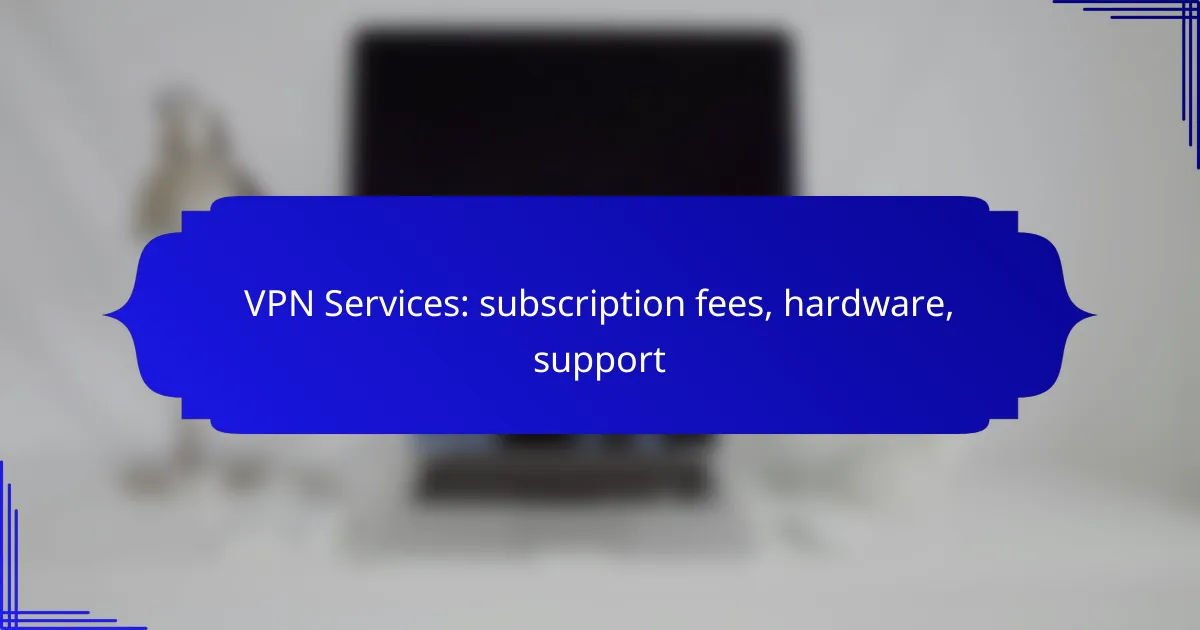Choosing the right VPN service involves understanding subscription fees, hardware requirements, and customer support options. In New Zealand, monthly fees generally range from NZD 10 to NZD 20, with providers like NordVPN, ExpressVPN, and Surfshark offering various features to meet diverse user needs. Additionally, having compatible hardware, such as routers and devices that support VPN software, is essential for optimal performance and security.
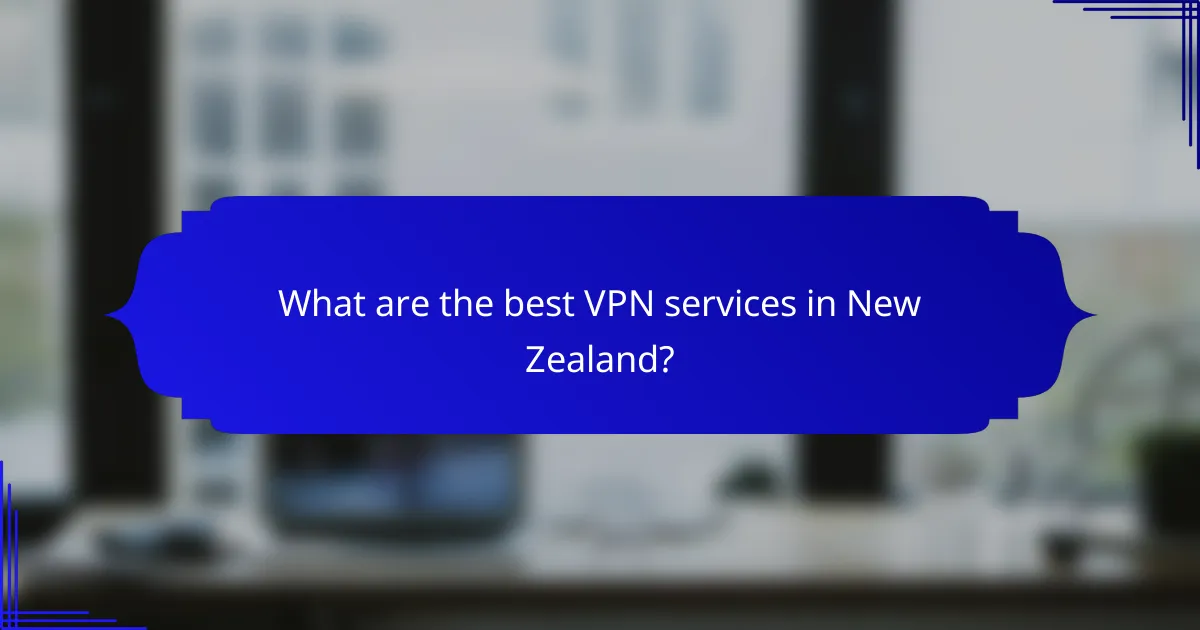
What are the best VPN services in New Zealand?
The best VPN services in New Zealand offer a combination of strong security, fast speeds, and reliable customer support. Key options include NordVPN, ExpressVPN, and Surfshark, each with unique features and pricing that cater to different user needs.
NordVPN
NordVPN is known for its robust security features, including double encryption and a strict no-logs policy. It offers a user-friendly interface and a large server network, which helps maintain fast connection speeds across New Zealand.
Subscription fees for NordVPN typically range from NZD 10 to NZD 15 per month, depending on the length of the commitment. Users can benefit from a 30-day money-back guarantee, allowing for risk-free testing of the service.
ExpressVPN
ExpressVPN is recognized for its exceptional speed and reliability, making it ideal for streaming and gaming. It employs strong encryption protocols and has a wide server network that ensures users in New Zealand can access global content seamlessly.
The subscription costs for ExpressVPN usually fall between NZD 12 and NZD 20 per month. They also provide a 30-day money-back guarantee, giving users the chance to evaluate the service without financial risk.
Surfshark
Surfshark stands out for its unlimited device connections, allowing users to protect multiple devices simultaneously. It features strong security measures and a user-friendly interface, making it suitable for both beginners and advanced users in New Zealand.
Pricing for Surfshark generally ranges from NZD 8 to NZD 12 per month, depending on the subscription length. Like the others, it offers a 30-day money-back guarantee, making it easy for users to try out the service without commitment.
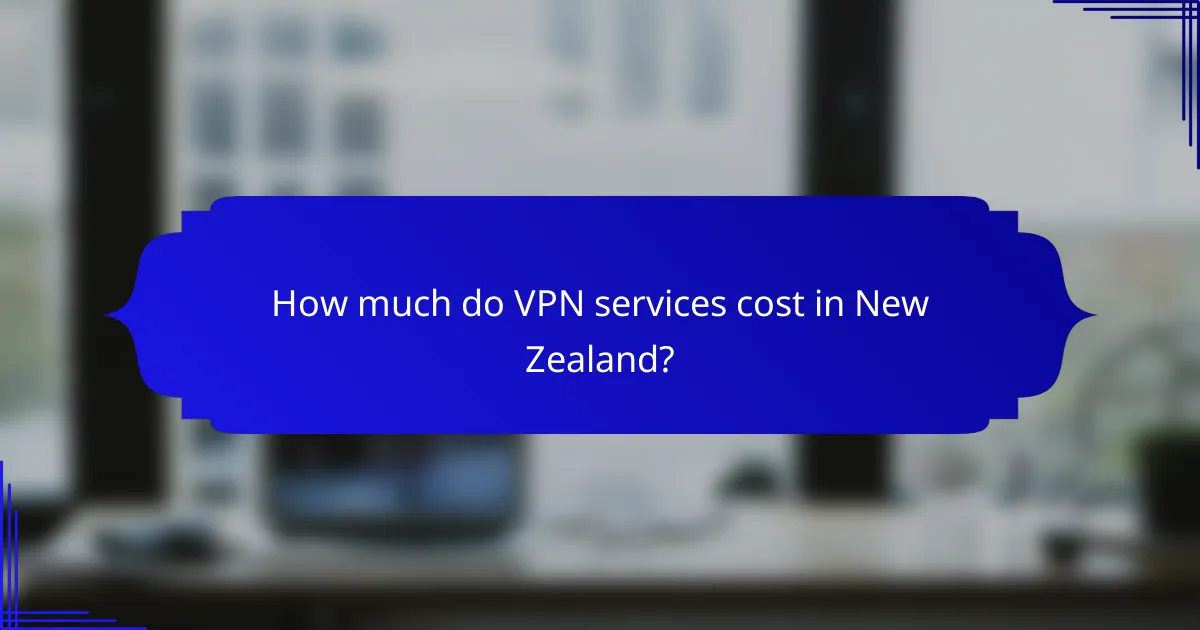
How much do VPN services cost in New Zealand?
VPN services in New Zealand typically range from NZD 10 to NZD 20 per month, depending on the provider and features offered. Many users consider factors like speed, security, and server locations when choosing a VPN service.
Monthly subscription fees
Monthly subscription fees for VPN services in New Zealand generally fall between NZD 10 and NZD 20. Some budget-friendly options may start as low as NZD 5, but these may lack essential features such as robust security or customer support.
When selecting a VPN, consider what features are included in the monthly fee. Premium services often offer better encryption, faster speeds, and access to a wider range of servers, which can justify a higher price.
Annual subscription discounts
Many VPN providers offer significant discounts for annual subscriptions, often reducing the monthly cost to around NZD 5 to NZD 10 per month when paid upfront. This can result in savings of 30% to 50% compared to monthly plans.
Before committing to an annual plan, check the refund policy. Some providers offer a money-back guarantee, allowing you to test the service risk-free for a limited time. This can help ensure you choose a VPN that meets your needs without a long-term commitment.
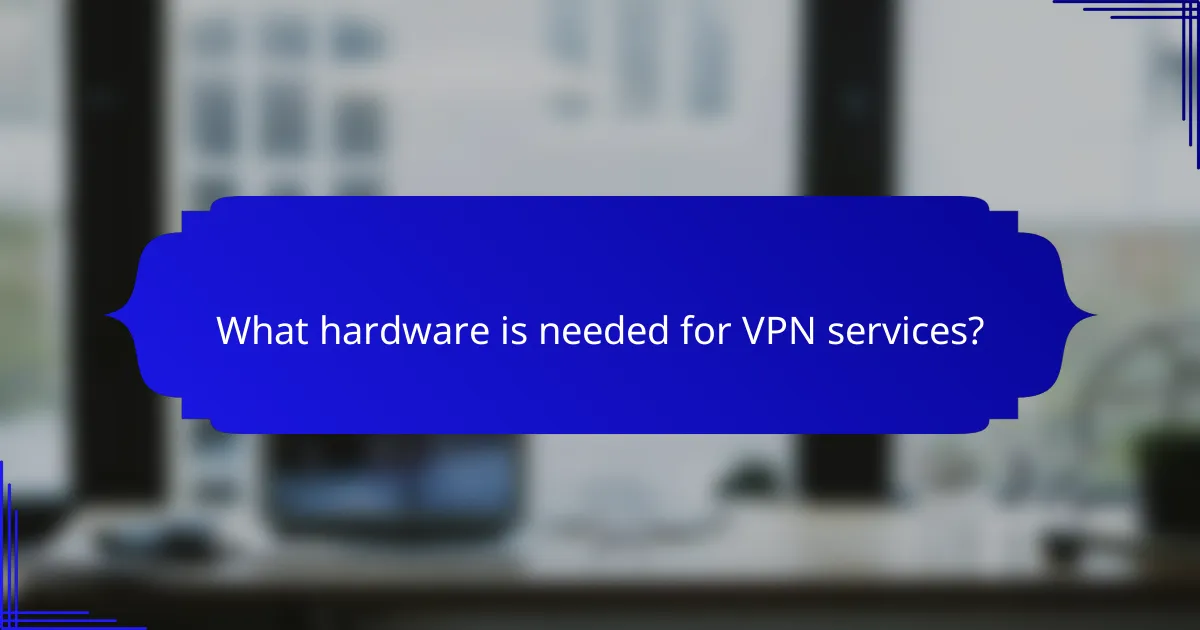
What hardware is needed for VPN services?
To use VPN services effectively, you typically need a compatible router and devices that support VPN software. This hardware ensures secure connections and allows multiple devices to access the VPN simultaneously.
Router compatibility
Not all routers support VPN functionality, so it’s crucial to check compatibility before purchasing. Look for routers that offer built-in VPN support or can be configured with VPN firmware, such as DD-WRT or Tomato.
When selecting a router, consider models that have sufficient processing power and memory to handle encryption without slowing down your internet speed. Popular brands like ASUS, Netgear, and Linksys often provide models that meet these requirements.
Device requirements
Devices such as computers, smartphones, and tablets need to have VPN client software installed to connect to the VPN service. Most operating systems, including Windows, macOS, iOS, and Android, support a range of VPN applications.
Ensure that your devices are updated to the latest software versions for optimal performance and security. Additionally, check the VPN service’s website for specific device compatibility and recommended configurations.
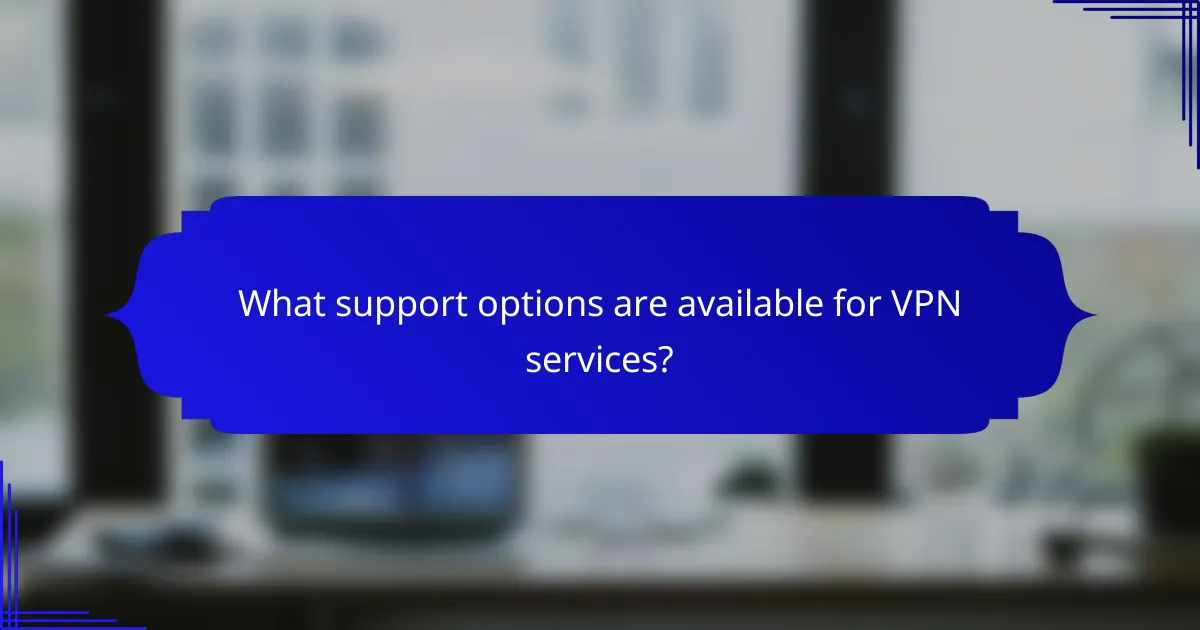
What support options are available for VPN services?
VPN services typically offer a range of support options to assist users with technical issues, account management, and general inquiries. These options can include 24/7 customer support, live chat assistance, and extensive online resources.
24/7 customer support
Many VPN providers offer 24/7 customer support to ensure users can get help whenever they need it. This support is often available through multiple channels, including phone, email, and ticketing systems. Having round-the-clock access can be crucial for resolving urgent issues, especially for businesses relying on VPNs for secure operations.
When evaluating VPN services, consider the responsiveness and effectiveness of their 24/7 support. Look for reviews or testimonials that highlight user experiences, as these can provide insights into the quality of assistance you can expect.
Live chat assistance
Live chat assistance is a popular support option among VPN services, allowing users to get immediate help without waiting for email responses. This feature is typically available on the provider’s website and can connect you directly with a support representative. Live chat can be particularly useful for quick questions or troubleshooting steps.
When using live chat, be prepared with specific details about your issue to expedite the process. Some VPNs may also offer chatbots for initial inquiries, which can help filter common questions before connecting you to a human agent.
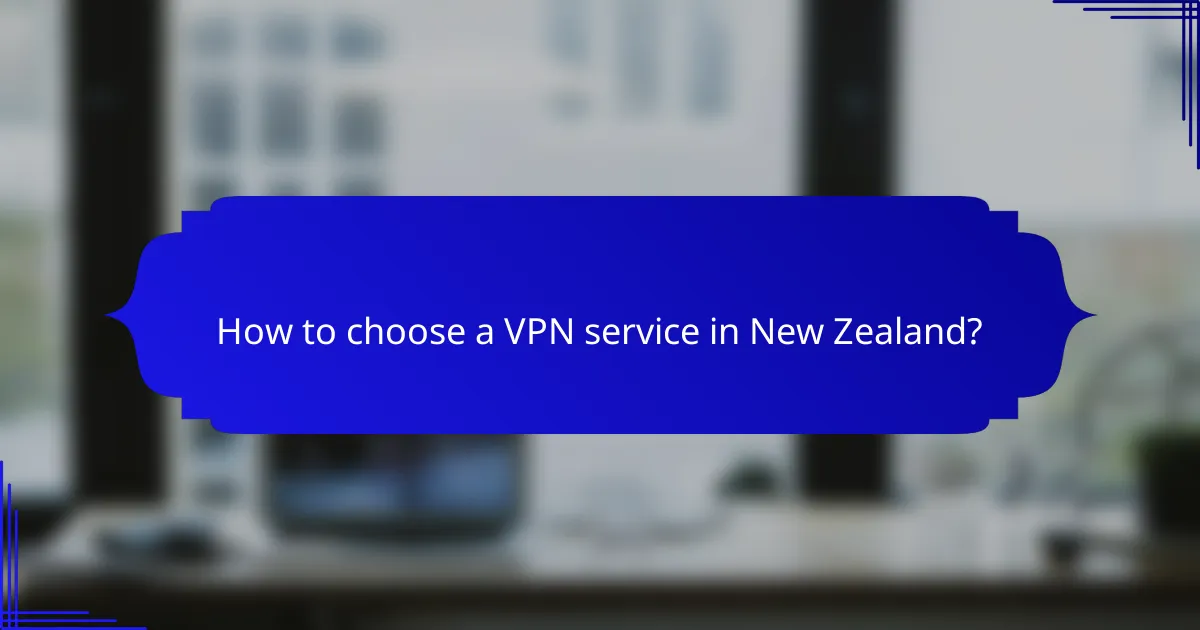
How to choose a VPN service in New Zealand?
Choosing a VPN service in New Zealand involves evaluating factors such as subscription fees, hardware requirements, and customer support. Prioritize services that offer a balance of security, speed, and usability to meet your specific needs.
Criteria for selection
When selecting a VPN service, consider the subscription fees, which can vary widely from affordable monthly plans to more expensive annual subscriptions. Look for services that provide a money-back guarantee, allowing you to test the service risk-free.
Hardware compatibility is another crucial factor. Ensure the VPN works seamlessly with your devices, whether they are Windows, macOS, Android, or iOS. Some VPNs offer dedicated routers, which can simplify setup for multiple devices.
Customer support is essential for troubleshooting and guidance. Opt for providers that offer 24/7 support through live chat or phone, ensuring assistance is available whenever you need it.
Comparison of features
Compare key features such as encryption standards, server locations, and connection speeds. Most reputable VPNs use AES-256 encryption, which is considered highly secure. Check if the service has servers in New Zealand and other locations relevant to your browsing needs.
Connection speed is vital for streaming and gaming. Look for VPNs that offer unlimited bandwidth and minimal latency. Many services provide speed tests or performance guarantees, which can help you make an informed choice.
Finally, review additional features like split tunneling, ad-blocking, and kill switches. These can enhance your online experience and security. A side-by-side comparison chart can be helpful to visualize these differences effectively.
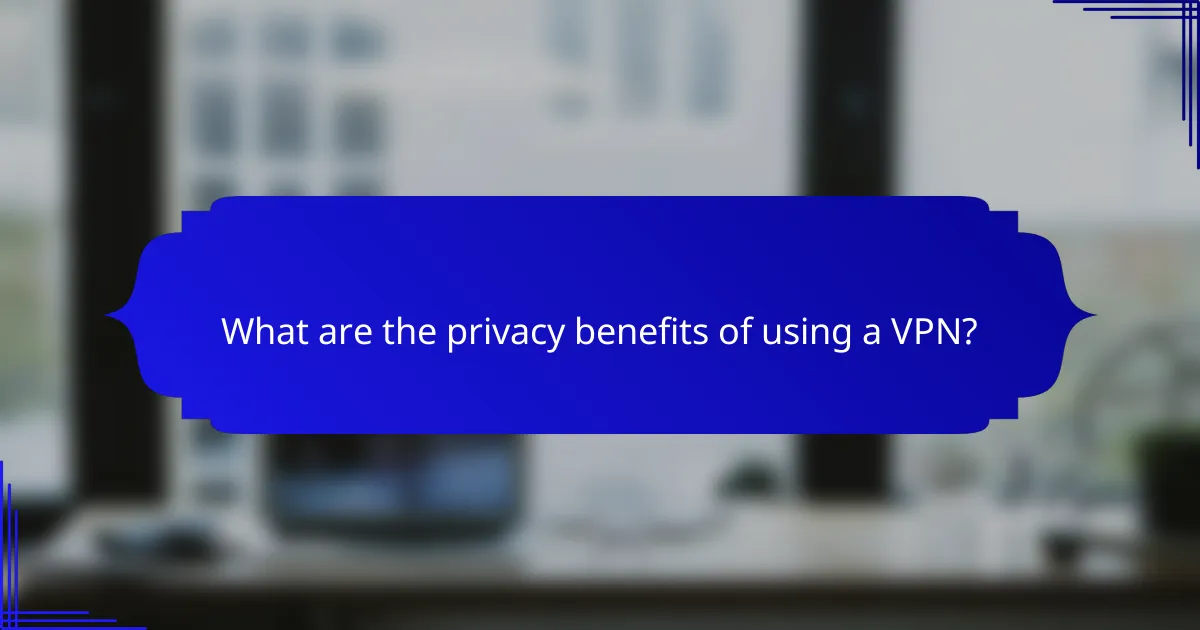
What are the privacy benefits of using a VPN?
Using a VPN provides significant privacy benefits by encrypting your internet traffic and masking your IP address. This helps protect your personal data from potential snoopers, whether they are hackers, advertisers, or government entities.
Data encryption
Data encryption is a core feature of VPNs that secures your online activities. When you connect to a VPN, your data is converted into a coded format that is unreadable without the proper decryption key. This means that even if your data is intercepted, it remains protected from unauthorized access.
Most reputable VPN services use strong encryption protocols, such as AES-256, which is considered highly secure. When selecting a VPN, ensure it employs robust encryption standards to maximize your privacy.
IP address masking
IP address masking is another crucial benefit of using a VPN. By routing your internet connection through a VPN server, your real IP address is hidden, and you appear to be browsing from the server’s location. This makes it difficult for websites and online services to track your activities or identify your physical location.
Masking your IP address can help you access region-restricted content and enhance your anonymity online. However, be aware that some websites may block VPN traffic, so it’s advisable to choose a VPN that offers a wide range of server locations and has a good reputation for bypassing such restrictions.
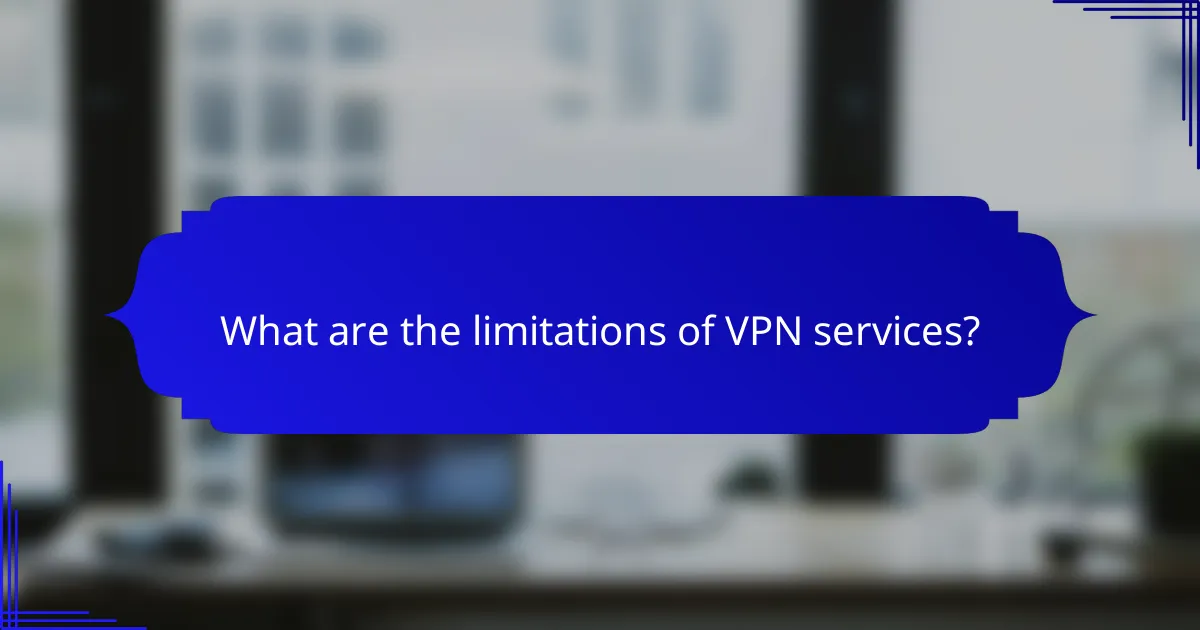
What are the limitations of VPN services?
VPN services come with several limitations that can affect user experience, including speed reduction and access restrictions. Understanding these limitations is crucial for optimizing your VPN usage and ensuring it meets your needs.
Speed reduction
Using a VPN often results in slower internet speeds due to the encryption process and the distance to the VPN server. Users might experience reductions in speed ranging from low tens of milliseconds to several seconds, depending on the server location and load.
To mitigate speed issues, choose a VPN provider with a large number of servers and high bandwidth capabilities. Additionally, connecting to a server that is geographically closer can help maintain better speeds.
Access restrictions
While VPNs can help bypass some geographical restrictions, they may also encounter access limitations. Certain websites and streaming services actively block known VPN IP addresses, making it difficult to access content.
To avoid these access issues, select a VPN that frequently updates its server IPs and offers features like obfuscation to mask VPN traffic. Always check the terms of service for the specific content you wish to access, as some services may have strict policies against VPN use.
